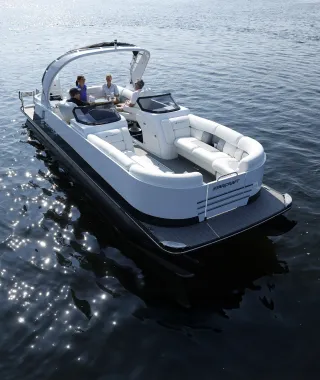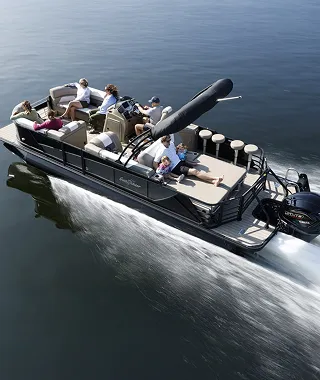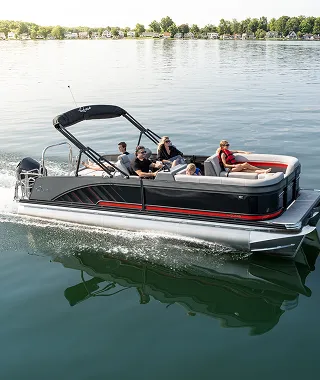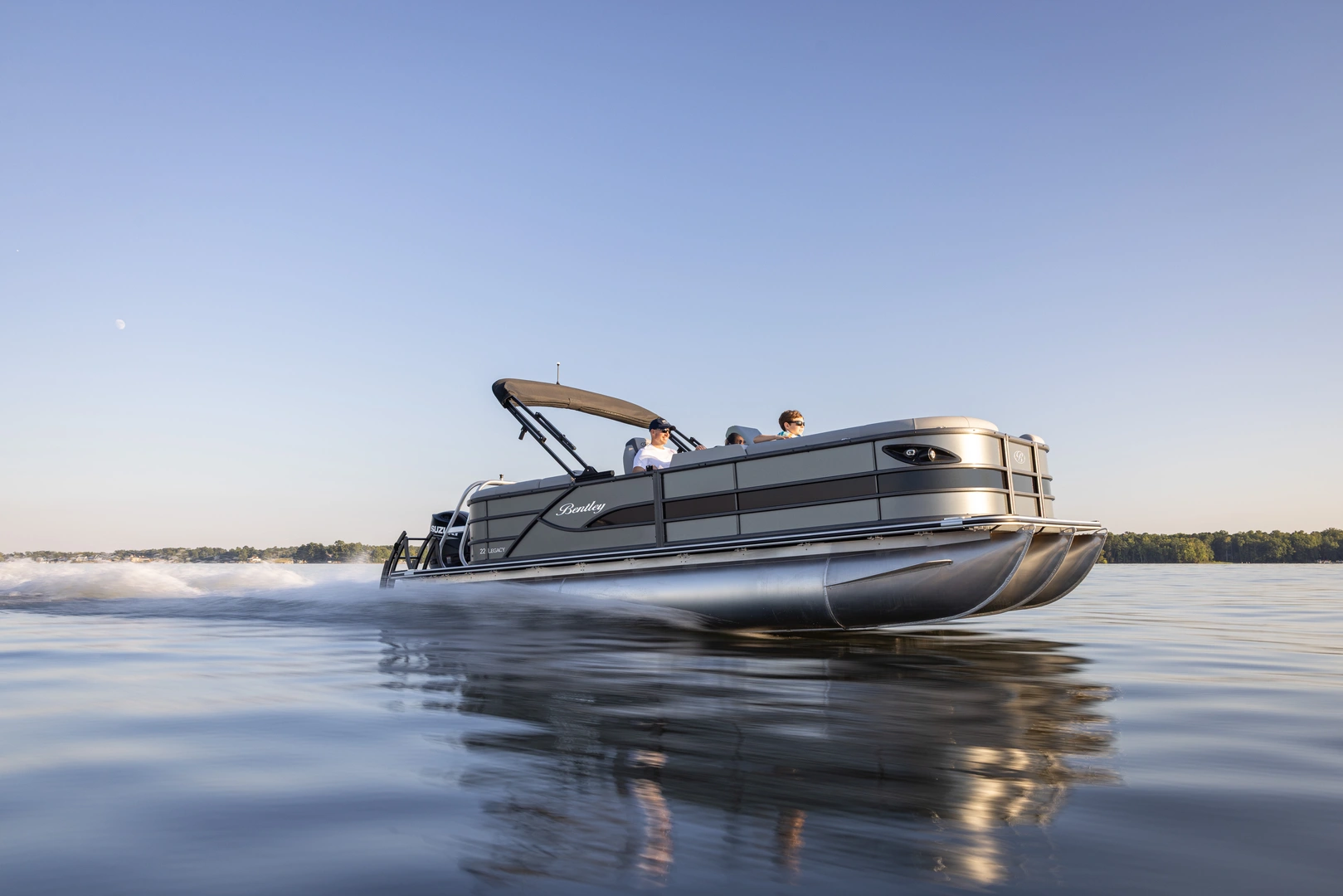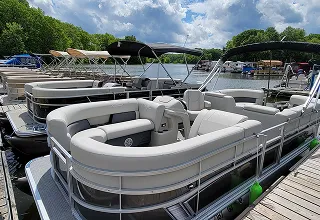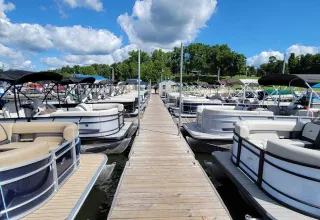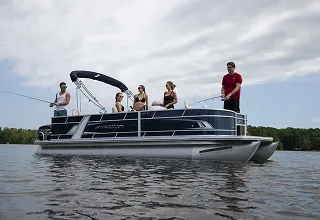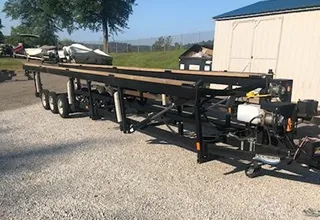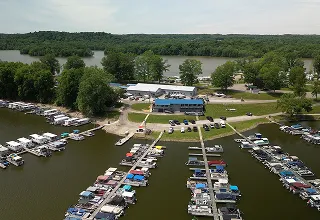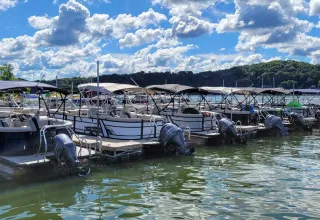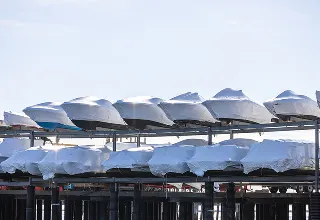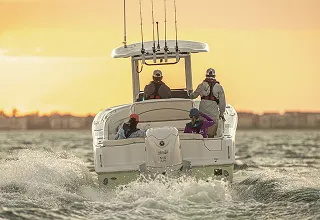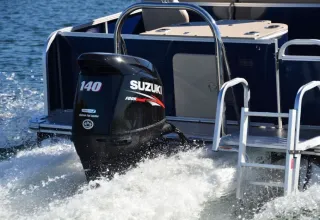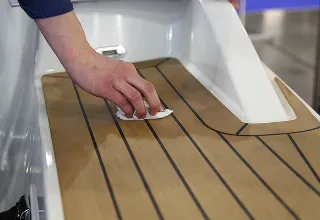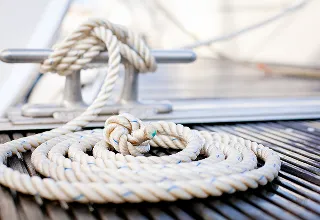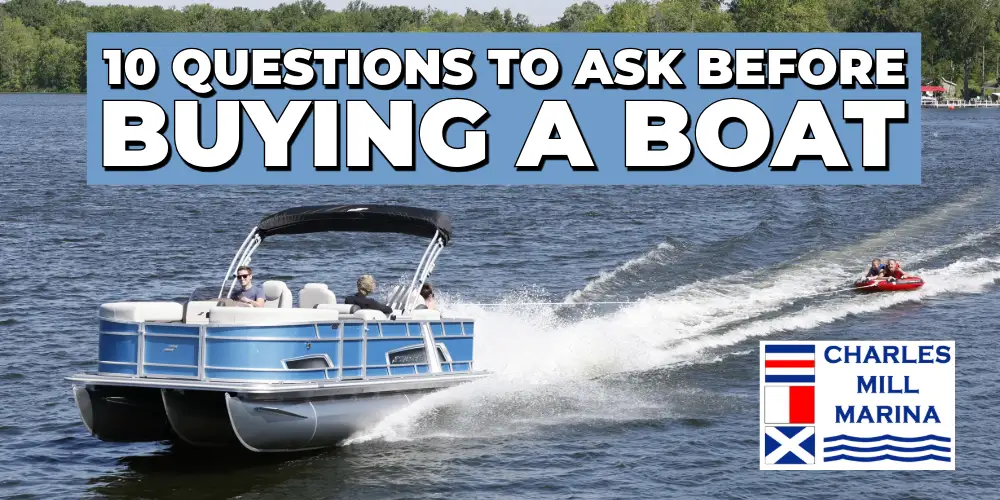Owning a pontoon boat is fun! It’s a great way to spend quality time with friends and family in the great outdoors, soaking up the sun and forgetting about the hassles of everyday life.
Whether you’re considering buying for the first time, or already own a boat and are looking to upgrade, here are 10 questions that we recommend you ask before making a decision.
1. What Does My Day on the Lake Look Like?
Before you think about anything else – just close your eyes and imagine what your day on the lake looks like.
The sun is shining, there’s a nice breeze, you’re relaxed and feeling great. What lake are you boating on? Who is with you? What activities are you doing (tubing/fishing/lounging/cruising)? How long do you plan to typically stay on your boat?
This is the MOST important question you can ask yourself because this answer will help you with every other question below.
2. What Is My Budget?
There are a wide range of boats available in every size, shape, color, brand, year, make, and model imaginable. Prices for pontoons can vary from $5,000 (for an older, used pontoon boat with issues) to $150,000 (for an absolutely deluxe boat rigged with powerful engines, deluxe seating and cool gadgets).
Spend some time researching what is right for you. Visit a boat dealership and spend time with a sales person. They should be able to provide you with an accurate price range for the activities that you want to do on your boat.
Many dealers will offer financing, and while terms will vary, the banks we deal with can often offer terms as long as 15 years with competitive interest rates. An affordable monthly payment is a key part of owning and enjoying a boat.
3. What Size of Boat Do I Need?
Most pontoon boats are between 16’ and 26’ in length. Smaller pontoon boats, such as 16’ or 18’ boats, offer more maneuverability, are easier to trailer, and cost less than their larger counterparts. People who don’t plan on having large groups on their boat often seek out smaller pontoons.
Larger pontoon boats can handle larger engines with higher performance, can fit more people and gear, and have more room to spread out. Tritoon boats are almost exclusively 22’ or larger, with most being between 24’ and 26’ in length. This additional size comes with a trade-off, as they are comparatively less maneuverable, more difficult and heavier to trailer, and cost more than smaller boats.

4. What Size of Outboard Engine Do I Need?
Think back to question #1 – what does your day on the lake look like? If your day includes high-speed cruising or watersports like tubing, skiing, or wakeboarding, you’ll need a large engine.
The size of your engine, combined with the size of your boat, will dictate your speed and performance. For example, a 20’ two-tube pontoon boat with a 115 HP engine will give you about the same speed as a 24’ triple-tube tritoon with a 150 HP engine, although the handling and turning will suffer.
At a minimum, tritoons should have a 150 HP engine. The third tube adds a significant amount of weight, and you need more power to push it. For skiing and wakeboarding, a 200 HP engine or higher is recommended for increased acceleration.
Also consider where you plan to use your boat. There are lakes with horsepower restrictions that will not allow above 10 HP or 25 HP. There are also lakes with large numbers of big, fast boats that might make it more difficult to navigate with a smaller, low-powered engine.
5. Does The Brand of Pontoon Boat Matter?
There are a lot of pontoon boat brands on the market, and many of them have been building boats for a long time. In recent years, several pontoon boat brands have been bought by large corporations. These companies tend to focus on bottom-line profitability at the expense of construction quality and customer satisfaction. Buyers of these boats end up paying more money than they should just because of the brand name on the side of the boat, and often have a poorer ownership experience.
We are proud to offer great boats from family-owned companies like Starcraft, SunChaser and Qwest that build value-driven products and put their name on the line every time a boat is delivered.
In our experience, the best manufacturers build high quality boats with superior construction techniques and have equally great warranties to give you peace of mind.
6. Should I Buy a Trailer?
Many buyers think that they have to buy a trailer with their pontoon boat. How else will the boat get in and out of the water?
While owning a trailer for your pontoon boat can offer you the freedom to move your boat as you wish, and take it to a different lake, it’s not an absolute necessity, and is an added expense that may not be worth it for all buyers. There is almost certainly a marina operator or local business in your area that will provide boat hauling services, as well as storage. This eliminates the expense of a pontoon trailer and allows you to spend more of your budget on the boat.
As a rule, you should consider buying a trailer if:
- You plan to take the boat to different lakes throughout the season.
- You don’t want to rely on someone else to move/store your boat.
You can also rent a pontoon trailer if you only need to use it on a limited basis.

7. What Comes Included in the Price of a Boat?
Make sure to double-check on what does and doesn’t come included in the advertised price of the boat. There are still dealers who advertise one price, but when you go to pay, have tacked on a laundry list of fees for freight, boat prep, financing, and delivery.
Also confirm what accessories do or do not come with a boat – some dealers consider items like mooring covers and safety equipment to be optional. Those are important items and should always be included in the sale price.
We pride ourselves on pricing transparency, and aim to make the buying experience as easy as possible. All freight and prep charges, financing, and delivery fees are included in our price. We also price each boat with a mooring cover and safety package included.
The only things we don’t include in our price is:
- Sales Tax – this will vary based on your state/county of residence)
- Boat and Motor title fees - which are $100 per titled unit, and do not apply to engines below 10 HP)
- Watercraft Registration Fees – It’s legally required to register your boat, we will take care of that. The registration fee for most pontoon boats in Ohio is $48 (as of 2026).
8. What Are the Docking, Maintenance, and Storage Costs?
Your boat is an investment, not just of your money, but also of your time! Make sure you have a good understanding of what additional costs are associated with boat ownership, such as costs for docking, maintenance, storage, hauling and service.
At the very least, you should be winterizing your boat’s engine every fall and have factory-recommended service performed on your motor once a year. We strongly recommend shrink wrapping your boat or storing your boat inside to protect it from winter weather. Additional services, like tube cleaning and boat detailing can keep your pontoon looking great.
Visit our service page to get a better idea of what these services cost at our marina.

9. Where Can I Have My Outboard Engine Serviced?
When you buy a boat, make sure that you have a local option to service the motor. Marine service shops are just like auto repair companies that specialize in specific motor brands and cannot work on other brands due to parts availability or technical knowledge.
You want a local option to be able to get you fixed up rather than waste a beautiful weekend driving your boat hours away to be fixed.
10. Should I Consider a Used Boat or a Boat Club?
Especially for first-time boaters, used boats and boat clubs can offer a great alternative to owning a boat.
Used boats can provide value vs a new boat but beware of buying someone else’s issues. Ask for service records and insist on test-driving the boat before payment. There’s nothing worse than getting a great deal on a boat, but then having several thousand dollars worth of repair bills before you can even use it.
Boat clubs have been rising in popularity in recent years and offer a boat ownership alternative. Most clubs offer a monthly or yearly membership that allows members to reserve and use a boat as they wish, without having to worry about paying extra fees for docking, service or storage.
Summary
If you can answer these questions, congratulations, you are an informed boat buyer! If you have questions or would like to learn more about boating, please do not hesitate to call or text us at 419-368-5951. We enjoy educating people about boating and guiding them to the boat of their dreams.


